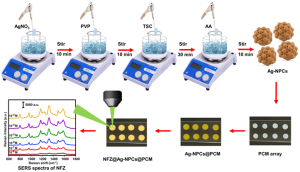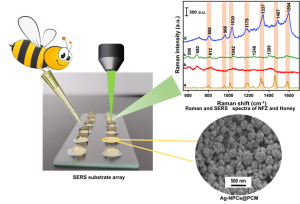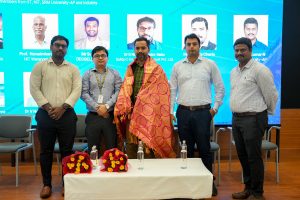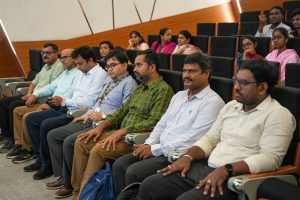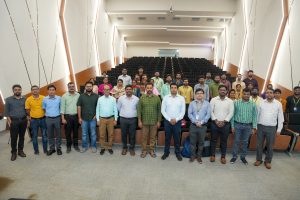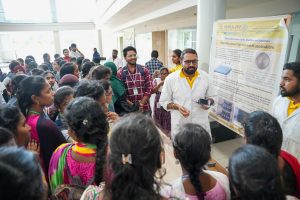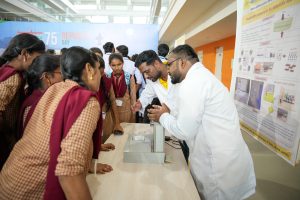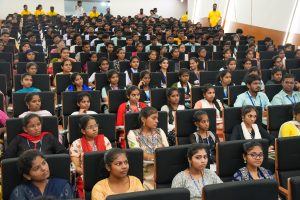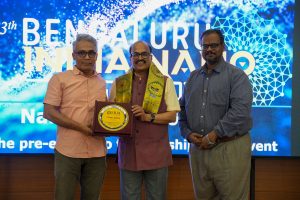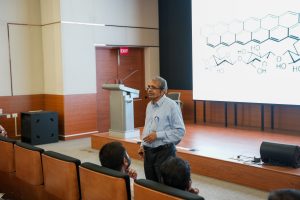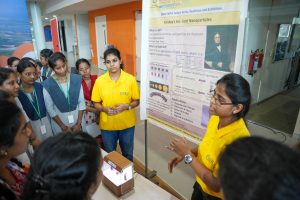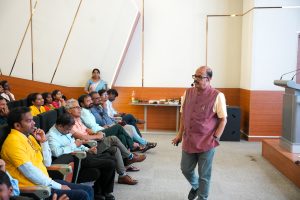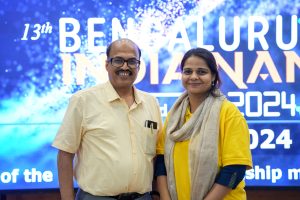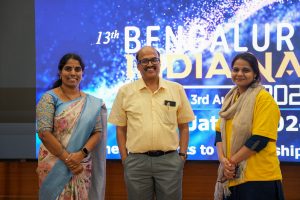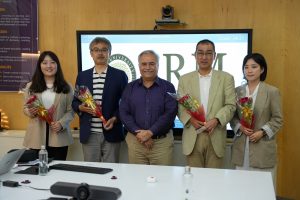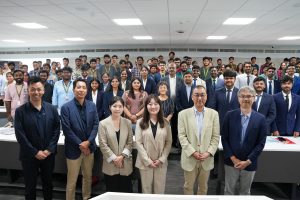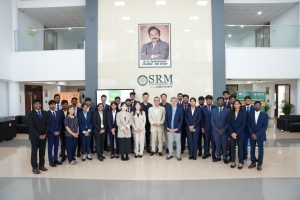A Novel SERS Substrate to Detect Food Contamination
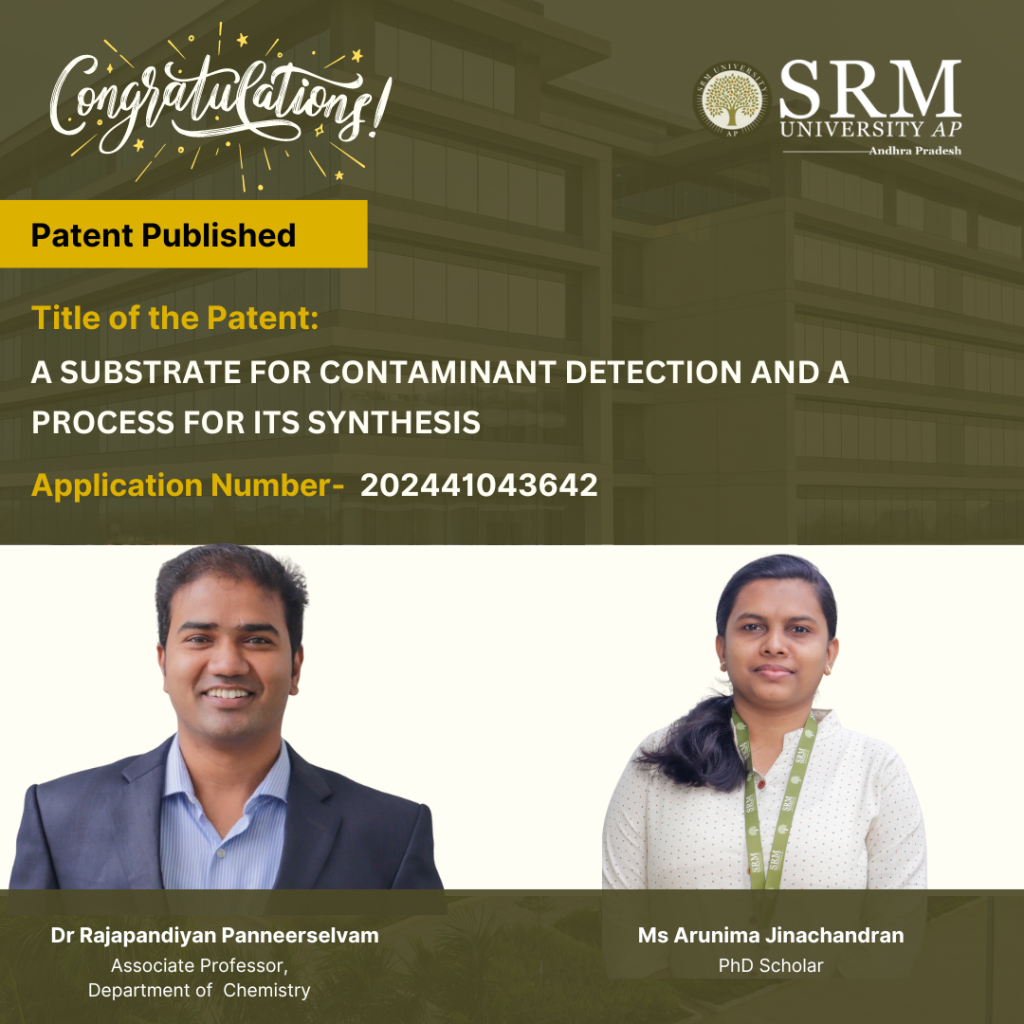
Dr Rajapandiyan P, Associate Professor, Department of Chemistry, and his PhD scholar, Ms Arunima Jinachandran, recently filed and published a patent, “A Substrate for Contaminant Detection and a Process for its Synthesis,” with Application Number: 202441043642 in the Patent Office Journal. The research duo has developed a novel SERS (Surface-Enhanced Raman Spectroscopy) substrate by synthesising silver nanopopcorn and depositing it on a polycarbonate membrane.
This novel substrate demonstrates excellent uniformity, reproducibility, and mechanical stability. It is used for the sensitive detection of toxic antibiotic nitrofurazone on fish surfaces and in honey. This breakthrough could significantly enhance food safety monitoring by providing a reliable and efficient method for detecting harmful substances.
Abstract
Detecting nitrofurazone (NFZ) in aquaculture and livestock is crucial due to its carcinogenic properties. This study presents a flexible polycarbonate membrane (PCM) with three-dimensional silver nanopopcorns (Ag NPCs) for NFZ detection on fish surfaces using surface-enhanced Raman spectroscopy (SERS). The Ag-NPCs/PCM substrate demonstrates a significant Raman signal enhancement (EF = 2.36 × 106) due to hotspots from nanoscale protrusions and crevices. It achieves a low limit of detection (LOD) of 3.7 × 10−9 M, with uniform and reproducible signals (RSD < 8.34%) and retains 70% efficacy after 10 days. The practical detection LODs for NFZ in tap water, honey water, and on fish surfaces are 1.35 × 10−8 M, 5.76 × 10−7 M, and 3.61 × 10−8 M, respectively, demonstrating its effectiveness for various samples. This Ag-NPCs/PCM substrate offers a promising approach for sensitive SERS detection of toxic substances in real-world applications.
Practical Implementation/ Social Implications of the Research
The practical applicability of the proposed Ag-NPCs/PCM SERS substrate is validated by successfully detecting NFZ in various actual samples, such as tap water, honey water, and irregular fish surfaces.
Collaborations – Prof. Tzyy-Jiann Wang – National Taipei University of Technology, Taiwan
Dr Rajapandiyan and Ms Arunima will continue to work towards the development of novel flexible SERS substrates for detecting toxic pollutants in food.
- Published in Chemistry-news, Departmental News, News, Research News
Founder Chancellor and University Leadership Meet the Honourable CM of AP
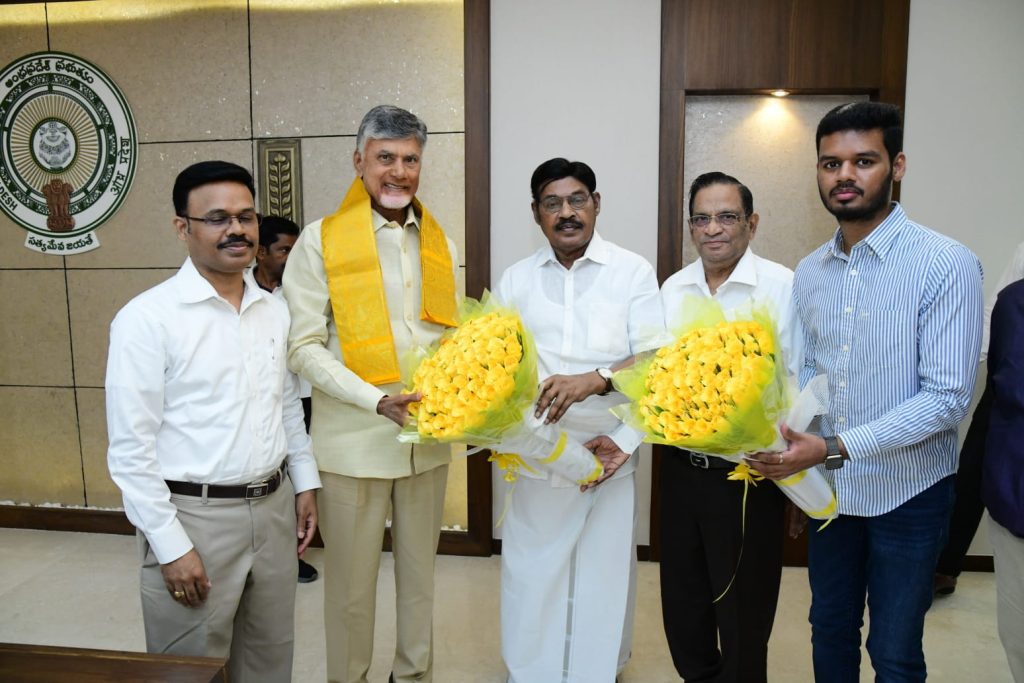
Founder Chancellor of SRM Group and former Member of Parliament Dr T R Paarivendhar and Pro-Chancellor Dr P Sathyanarayanan met the Chief Minister of the state, Shri Nara Chandrababu Naidu, at the Office of the Secretariat. This is the second visit of the university leadership to the Chief Minister’s Office, as the former had first approached the CM to extend their congratulations on his fourth tenure as the head of the state government.
Dr Paarivendhar briefed Chief Minister Shri Naidu about the development and planned expansion projects of SRM University-AP in Amaravati. “As a premier institute disseminating tertiary education to the ground roots of the country, we politely urge the government under the lead of Shri Chandrababu Naidu to cordially aid SRM University-AP’s subsequent projects to provide world-class education and empower our country’s youth”, said Dr Paarivendhar.
Emphasising the importance of educating the youth in emerging fields such as Artificial Intelligence, enhancing 21st-century skills and the significance of an industry-led academic curriculum to the Chief Minister, Dr Sathyanarayanan stated that “The support from the state government is pivotal for the SRM University-AP to undertake new projects. The development of the institute will summate to the progression of the state by enhancing literacy and human capital.” He suggested that an additional 100 acres could be allotted to the university as per the agreement made during the establishment of the university.
Chief Minister Chandrababu Naidu responded positively and concurred with the proposal proffered by the university leadership. Shri Naidu promised to provide all required resources and support towards the university’s growth and expansion.
Vice Chancellor Prof. Manoj K Arora, Executive Director (SRM Group) Prof. D Narayana Rao, and Registrar Dr Premkumar, were also part of the leadership cohort that met the Honourable CM.
- Published in News
A Look into Sequential Art: Exploring Sean Michael Wilson’s Graphic Creations
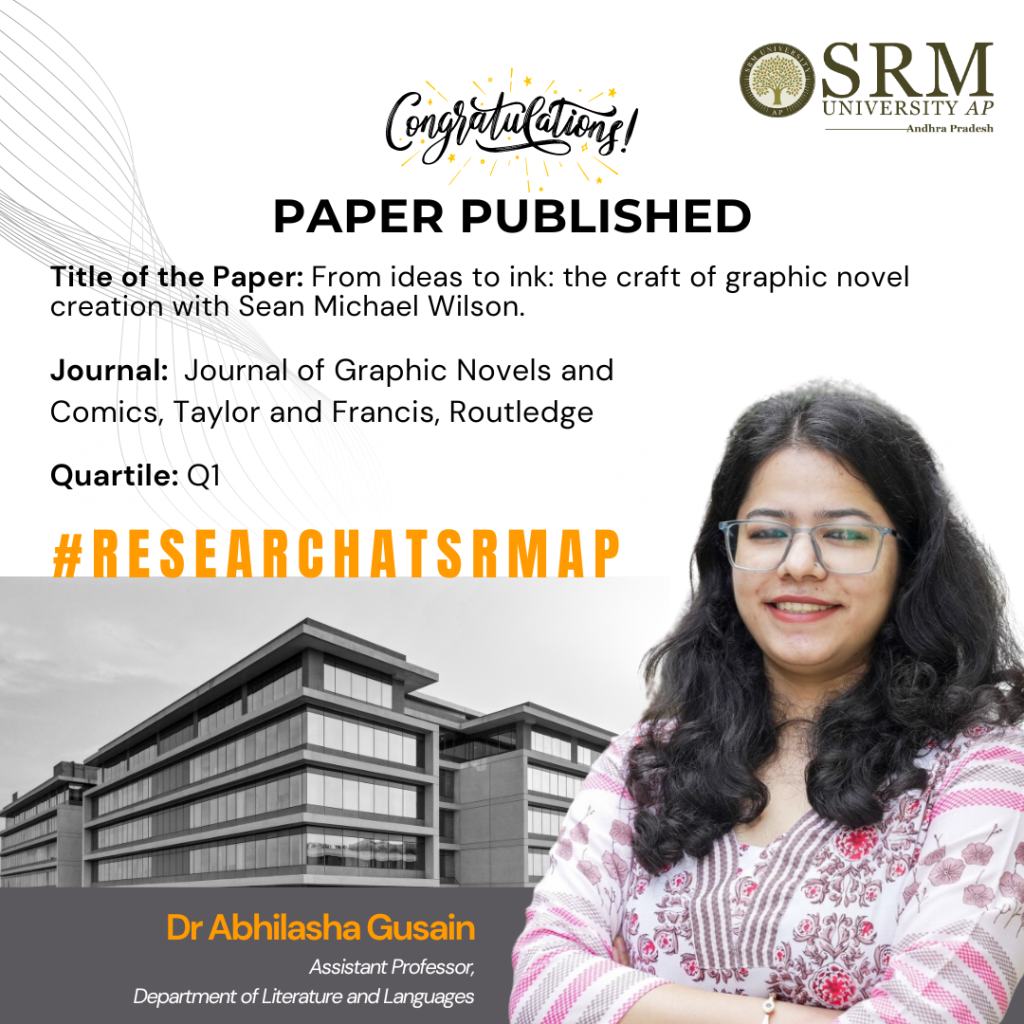
Graphic novels, a subgenre of comics, have witnessed stellar growth in popularity, encouraging readers to decipher meaning from the text and the images. The combination of visual and textual storytelling aids readers in decoding complex narratives. Dr Abhilasha Gusain, Assistant Professor from the Department of Literature and Languages, has published a paper titled “From Ideas to Ink: The Craft of Graphic Novel Creation with Sean Michael Wilson” in the Journal of Graphic Novels and Comics.
The current research advances the field of comics studies, highlighting aspects related to the industry like readership, publication, and distribution of graphic narratives across the globe. It emphasises the process of creation of a graphic novel, with reference to author Sean Michael Wilson’s works.
Abstract
In this interview, Sean Michael Wilson delves into his multifaceted career as a graphic novel writer, revealing the intricacies of his creative process, the challenges of adapting complex subjects into visual narratives, and the evolving role of graphic novels in cultural discourse. With over 40 projects under his belt, Wilson shares his approach to beginning new works, whether they stem from original ideas or/are adaptations of historical events and existing literature. He discusses the balance between authenticity and readability, the importance of research, and the collaborative dynamic between writer and artist in bringing graphic novels to life. Wilson also touches on the broader implications of graphic novels in education and social commentary, the economic realities of the industry, and the impact of digital platforms on publishing. His experiences across different cultures, particularly between the West and Japan, provide insight into the global reception of his work. Throughout the interview, Wilson emphasises the power of graphic novels as a medium for storytelling, education, and political engagement.
- Published in Departmental News, English Current Happenings, English news, News, Research News
Upskilling “You” to Enhance Career Opportunities
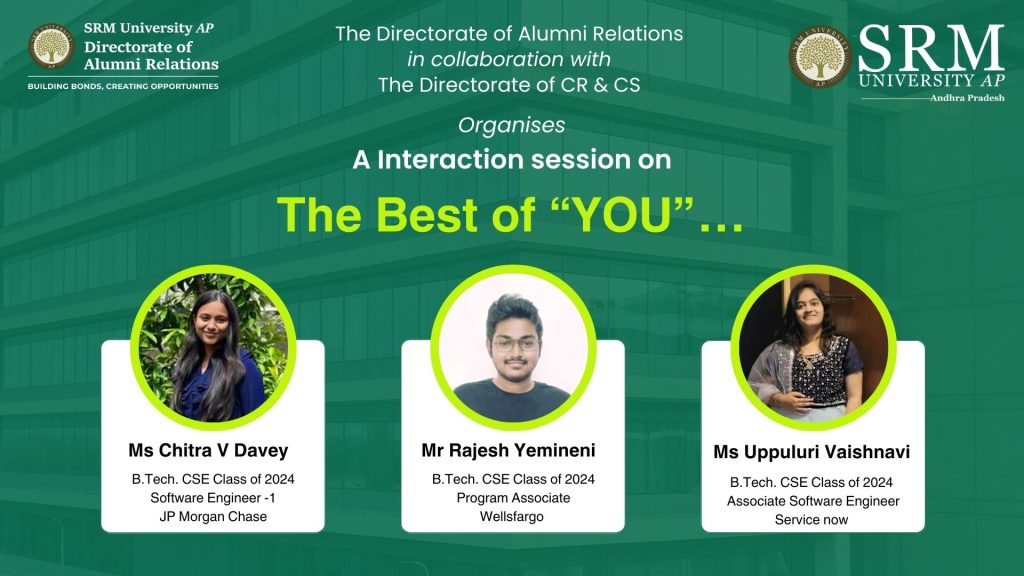 Creating a roadmap for learning and constantly upskilling oneself is essential to achieving career growth and stability. The interactive session conducted on July 06, 2024, by the Directorate of Alumni Relations and the Directorate of CR & CS emphasised this very requirement. The alumni of the institute, Mr Rajesh Yemineni, B.Tech. CSE Class of 2024, currently working as a Program Associate at Wells Fargo, and Ms Uppuluri Vaishnavi, B.Tech. CSE Class of 2024, Associate Software Engineer at Service Now, delivered a wonderful session with participants leaving with pro tips to crack interviews and designing their own roadmap to success by choosing their specialisations and courses.
Creating a roadmap for learning and constantly upskilling oneself is essential to achieving career growth and stability. The interactive session conducted on July 06, 2024, by the Directorate of Alumni Relations and the Directorate of CR & CS emphasised this very requirement. The alumni of the institute, Mr Rajesh Yemineni, B.Tech. CSE Class of 2024, currently working as a Program Associate at Wells Fargo, and Ms Uppuluri Vaishnavi, B.Tech. CSE Class of 2024, Associate Software Engineer at Service Now, delivered a wonderful session with participants leaving with pro tips to crack interviews and designing their own roadmap to success by choosing their specialisations and courses.
The talk helped students create a comprehensive roadmap to ensure a structured approach to learning. Prioritisation of topics with a focus on DSA, DBMS, OS, and CN was discussed to build a strong foundation in core CSE subjects. The alumni also encouraged students to practice coding problems and projects, applying theoretical knowledge to real-world scenarios to gain practical experience and build a portfolio.
The alumni also shared tips and tricks for overcoming interviews and flying with passing colours. From breaking down complex problems to practising coding problems and projects, these insightful tips ensured that our students would be ready to take on their desired career paths. Staying updated with industry trends and advancements to remain competitive in the job market was also prioritised.
The session concluded with the alumni encouraging students to step out of their comfort zones and challenge themselves, pushing beyond current limits to achieve growth and success and developing a growth mindset.
- Published in Alumni Relations, Alumni Relations News, CR&CS NEWS, Departmental News, News
Skill Enhancement Programme: Understanding Renewable Energy and Smart Transportation
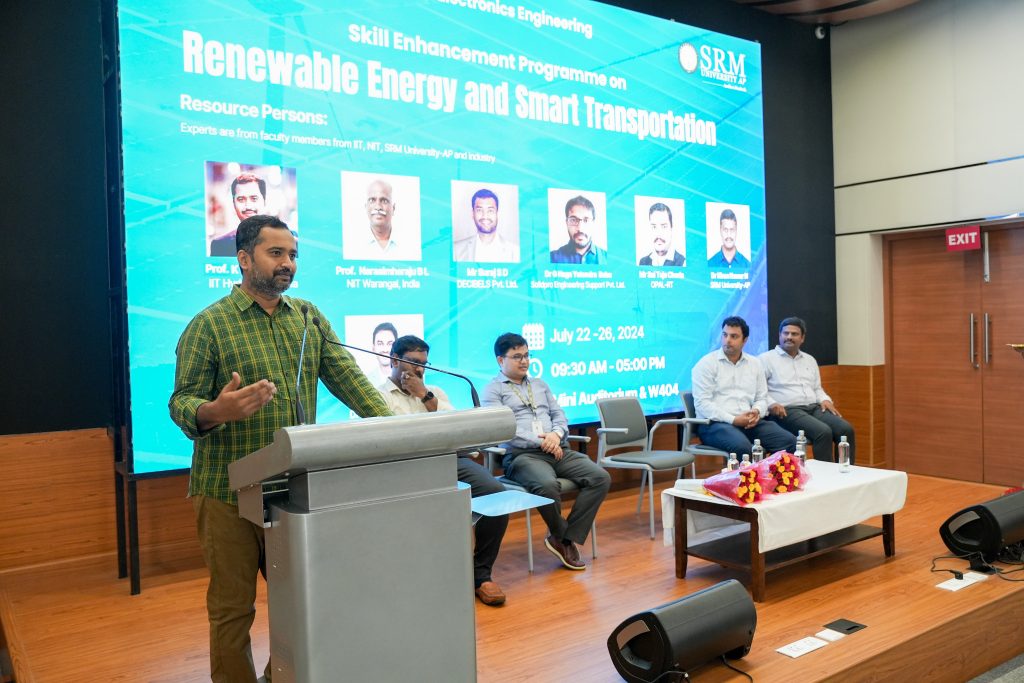
The Department of Electrical and Electronics Engineering hosted a highly successful five-day Skill Enhancement Programme on “Renewable Energy and Smart Transportation” from July 22 to July 26, 2024, signalling a major leap forward in addressing the vital sectors of electric vehicles and renewable energy systems. The programme conducted in a hybrid mode, featured live lectures, hands-on training, and interactive sessions, drawing a total of 50 participants. Chief Guest Dr K Sivakumar, HOD-EEE, IIT Hyderabad, highlighted the pressing need for such skill development initiatives and stressed the importance of keeping abreast of advancements in renewable energy and smart transportation.
Expert sessions on the emerging domains of Renewable Energy, including Advanced Power Conversion and Efficient Drives, Design and Simulation Tools, Battery Management and Charging Infrastructure, and Sustainability and Renewable Integration, fostered an in-depth understanding and application of the latest technologies in these fields.
Dr K Sivakumar started off the programme with an engaging session on advanced power conversion techniques and control strategies for electric vehicles. His insights into modern electric vehicle design set a strong foundation for the week. Participants gained a deep understanding and a solid theoretical base on the latest advancements in power converters and control techniques, which are crucial for the design and development of efficient electric vehicles.
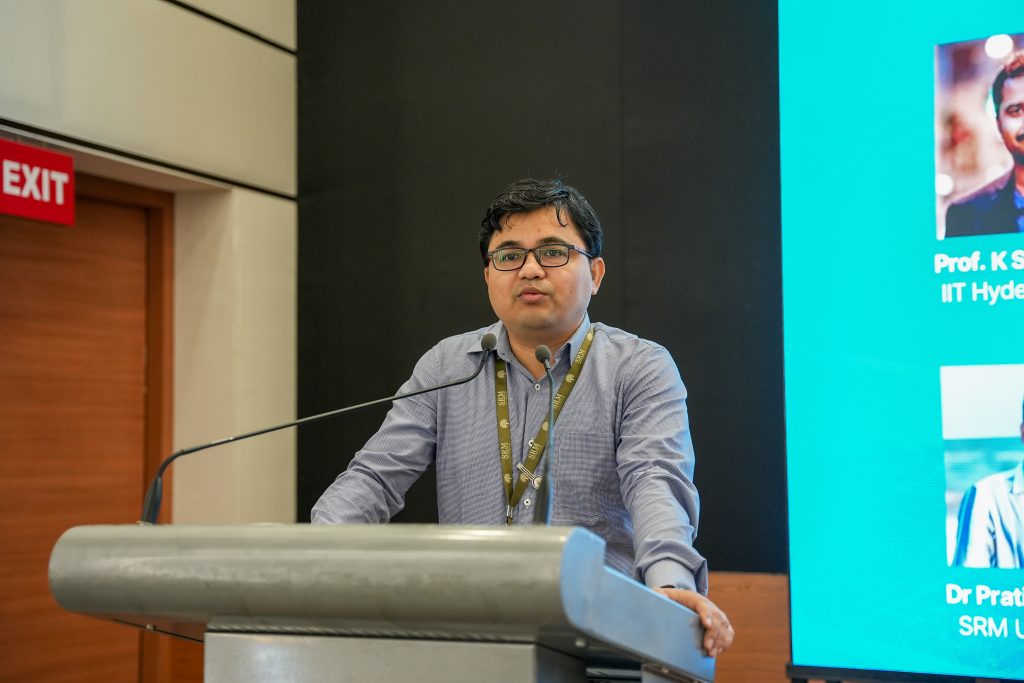
Subsequent technical sessions were led by esteemed experts from academia and industry, such as Dr Narasimharaju B L from NIT Warangal, Mr Suraj from Decibels Pvt. Ltd., Dr G Naga Yatendra Babu from Solidpro Engineering Support Pvt. Ltd., Mr Sai Teja Cherla from OPAL-RT, and Dr Kiran Kumar N, Dr Pratikanta Mishra from and Dr V Naresh Kumar from SRM University-AP.
Overall, the Skill Enhancement Programme provided participants with a comprehensive understanding of renewable energy and smart transportation, blending theoretical knowledge with practical skills and fostering discussions on current challenges and future opportunities in these fields.
- Published in Departmental Events, Departmental News, EEE, EEE NEWS, News
“From Andhra to Paris” – SRM AP’s Rising Star Selected for Paris Olympics 2024
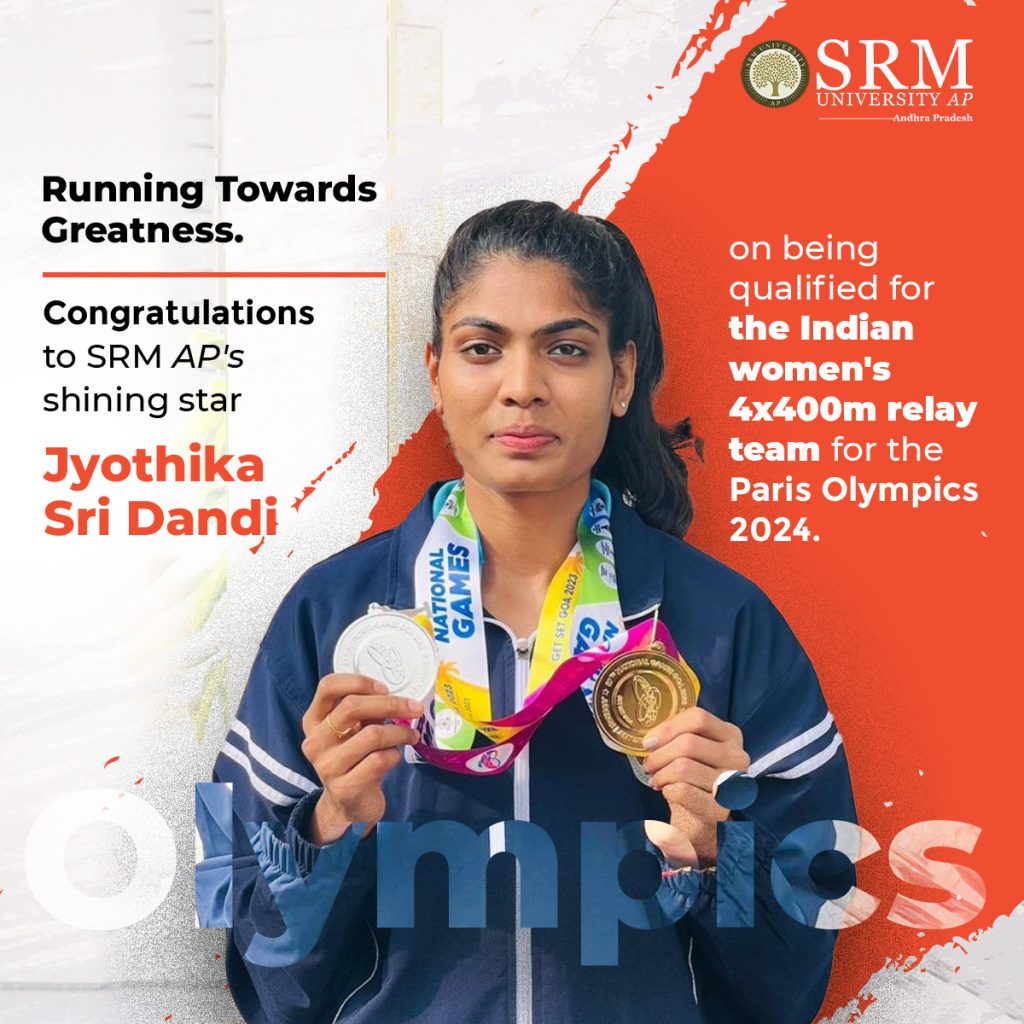
Ms Jyothika Sri Dandi, our first-year B.A. student at the Easwari School of Liberal Arts, has qualified for the Indian Women’s 4x400m Relay Team for the world’s foremost sports competition, the Paris Olympics 2024. Dr Dhiraj Parasher, Director–Sports, congratulated Ms Jyothika on this phenomenal achievement. He remarked, “To become an Olympian is a monumental mark in the career of an athlete. We are swelled with pride and offer unwavering support as we soundly believe that Jyothika will create history and return as an Olympic champion.”
Vice Chancellor Prof. Manoj K Arora also expressed his pride and zeal by stating, “Ms Jyothika is a national treasure that instils a belief and ambition in every young girl who dreams of being an Olympian. We, at SRM University-AP, wish her success and victory as she crafts her name in the tapestry of champions.”
Hailing from Tanuku town in the West Godavari district of Andhra Pradesh, the two-time national champion has paved her way to the elite sports championship through hard work, determination, and resilience.
Ms Jyothika had her breakthrough in 2021 when she secured Gold in the 400-metre race at the Indian U23 Championships. Her winning streak continued as she forged ahead to make her mark in 2023 by winning the Indian National Open Championships for 400 metres race in Thiruvananthapuram and winning bronze in the women’s 4 x 400 metres relay at the 2023 Asian Athletics Championships in Bangkok. Her blistering pace and performance at the 2024 World Relays Championships in Nassau, Bahamas, secured the Indian women’s relay team’s ticket to the Paris Olympics.
As the 2024 Paris Olympics unfolds, it is a moment of pride and anticipation for SRM University-AP as the institute extends its heartfelt wishes to Ms Jyothika and the Indian contingent representing our nation on this monumental platform.
- Published in News, Sports News, student affairs news, Students Achievements
“Nano Jatha”: A Pathway to Nanoscience and Technology
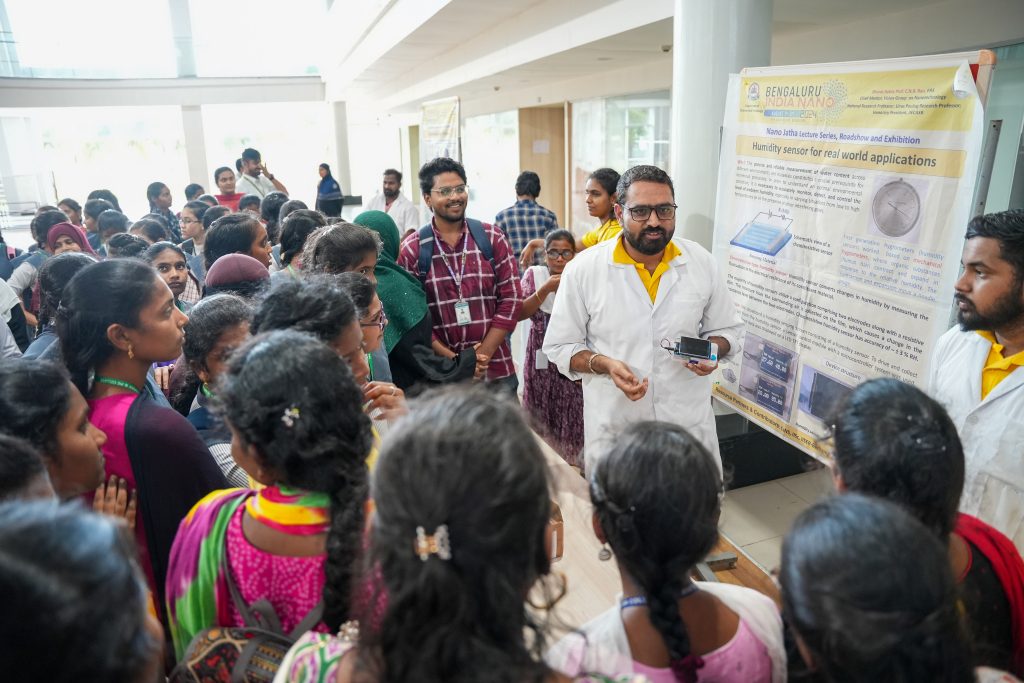
As part of the 13th edition of the Bengaluru India Nano 2024, heralded by Bharat Ratna recipient and renowned chemist Prof. C N R Rao, SRM University-AP hosted “Nano Jatha“, an intensive science outreach programme, catering to educate undergraduate graduates on the emerging trends of nanotechnology, on July 20, 2024. The Nano Jatha programme organised, aimed to raise awareness on nanoscience and technology through technical presentations by expert scientists and a distinctive live experiment demonstration of nano kits focused on showcasing nanoscience ideas.
The event featured two expert talks by eminent dignitaries. Prof. B L V Prasad, Director-Centre for Nano and Soft Matter Sciences (CeNS), Department of Science and Technology, Govt. of India, also serving as the Nodal Officer for organising Nano Jatha events, delivered a session on the introduction to nanoscience and technology. “Nanoscience and technology are often foretold as the technology of the future. This multidimensional technology will revolutionise our understanding of every natural phenomenon and every aspect of human life,” remarked Prof. Prasad in his session.
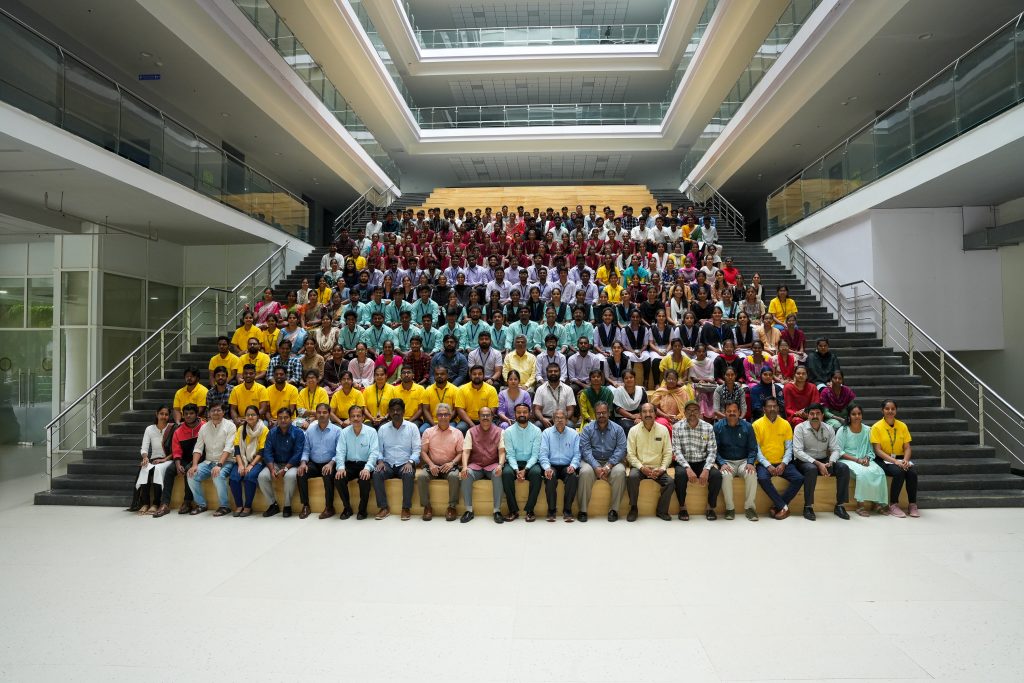
Prof. C P Rao, Senior Professor at the Department of Chemistry, presented the second expert talk on the applications of nanomaterials. The session delved into the properties of covalent molecules and its assemblage leading to cutting-edge technology. The programme also featured an exhibition were experiments on Gold nanoparticle; Galvanization reaction between metals; Piezoelectric pavement for futuristic applications; Humidity sensors for real-world applications and many more were displayed.
Prof. C V Tomy, Dean-School of Engineering & Sciences and Dr Pardha Saradhi Maram, Head-Department of Chemistry, emphasised that the Nano Jatha exemplified the university’s commitment to hands-on learning in science, specifically nanotechnology.They commented that the Department of Chemistry is dedicated to fostering scientific knowledge and igniting passion for chemistry among students and educators alike and will continue to organise events like Nano Jatha, conferences, workshops, and Faculty Development Programmes to achieve the same.
Over 300 students from 7 regional colleges in Andhra Pradesh participated in the programme, displaying their zeal in the discussions and nano kit demonstrations. The event was well executed benefitting the student community significantly in understanding various emerging fields in science and technology.
- Published in Chemistry-news, Departmental News, News
MOU with ASPIRE BioNEST, UoH for Augmenting Innovation and Incubation
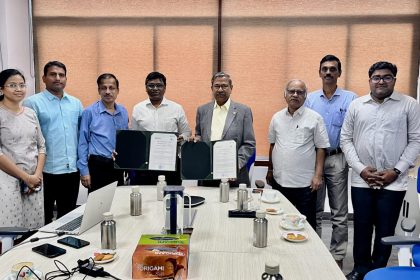
SRM University-AP signs an MOU with the Association for Scientific Pursuits in Innovative Research BioNEST (ASPIRE BioNEST) of the University of Hyderabad, facilitating a dynamic transformation in the innovation and entrepreneurial ecosystem of the institute. Prof. S Rajagopal, Director ASPIRE BioNEST and Dr R Premkumar, Registrar, SRM University-AP signed the MOU in the presence of Dr Anil Kondreddy, COO, ASPIRE BioNEST, Prof. Jayaseelan Murugaiyan, Associate Dean-Sciences, SRM University-AP and Dr Pitchaiah Cherukuri, Assistant Professor, SRM University-AP.
The agreement will ensure guidance and support from ASPIRE BioNEST in establishing, operating and maintaining the best innovation and incubation practices at the SRM AP incubation centres. ASPIRE BioNEST will also provide support in selection of incubates/start-ups, finalising facilities/designs, procurement of instruments and help in formulating guidelines and policies for operating incubation centres at the university.
The MOU is a significant milestone for the young innovators and venturers at SRM AP as ASPIRE BioNEST will furnish internship opportunities with incubatees and startups at ASPIRE, mentor support for startups, collaboration in applying for grant proposals and raising funds, and training and skill development programmes.
Vice Chancellor, Prof. Manoj K Arora expressed his ardour on the collaboration. He stated that “ASPIRE BioNEST is one of the Best Bio-incubator where most of the innovative research is translated into technologies. As an institute that prioritise innovation and entrepreneurship, this MOU will stimulate and enrich SRM University-AP’s entrepreneurial culture, helping us to become one of the preferred incubation and innovation centres in Andhra Pradesh.”
ASPIRE BioNEST of the University of Hyderabad is a deep-tech life sciences incubator established in 2018 with the support of BIRAC, Government of India and ASPIRE, a section 8 non-profit company established by University of Hyderabad. One of the key objectives of ASPIRE BioNEST is to provide support and guidance, including technological, professional and collaborative inputs to help other incubation centres raise their entrepreneurial culture. With the agreement, both SRM University-AP and ASPIRE BioNEST have undertaken to synergistically support each other in the larger interest of innovation and entrepreneurship.
Exploring Wire Arc Additive Manufacturing
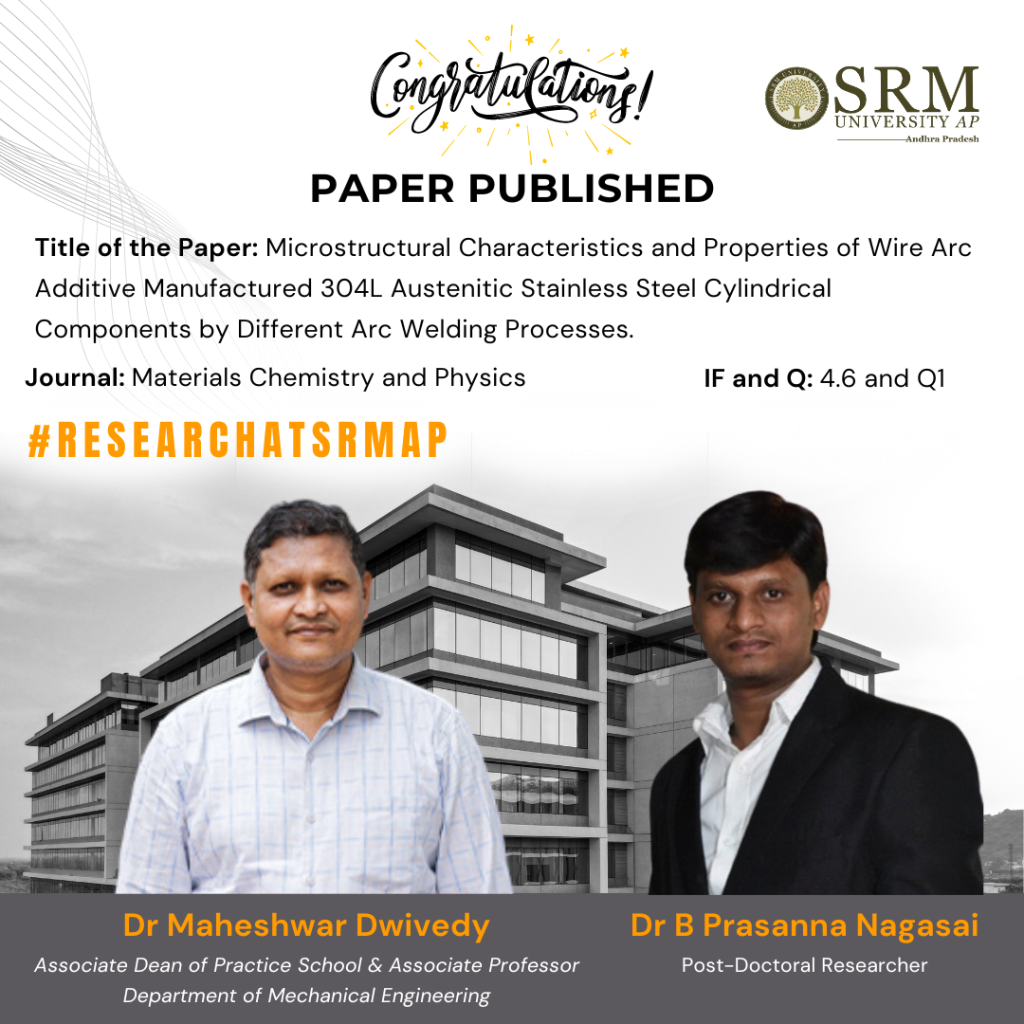
Wire Arc Additive Manufacturing (WAAM) is revolutionizing how we make metal components, especially when it comes to materials like 304L austenitic stainless steel—a popular choice in industries such as aerospace, automotive, and healthcare due to its durability and corrosion resistance. The research paper titled “Microstructural Characteristics and Properties of Wire Arc Additive Manufactured 304L Austenitic Stainless Steel Cylindrical Components by Different Arc Welding Processes” published by Dr Maheswar Dwivedy, Associate Professor, Department of Mechanical Engineering and his post-doctoral scholar Dr B Prasanna Nagasai explores this innovative manufacturing method in detail, focusing on how different welding techniques affect the end product.
Overall, this research indicates that WAAM, with its different welding techniques, can produce 304L stainless steel cylinders that potentially outperform those made by conventional forging, both in terms of material efficiency and mechanical properties. Such findings are significant as they point towards more sustainable and cost-effective manufacturing methods that do not sacrifice quality.
Abstract
Wire arc additive manufacturing (WAAM) is an advanced additive manufacturing (AM) technology that offers low cost and high deposition rates, making it suitable for building large metal parts for structural engineering applications. However, various welding procedures result in differing heat inputs and repetitive heating treatments throughout the deposition process, which can affect the microstructural and mechanical characteristics of the parts. In the current study, cylindrical parts made of 304L austenitic stainless steel (ASS) were manufactured using the WAAM technique, employing both gas metal arc welding (GMAW) and cold metal transfer (CMT) processes. This study explores the correlation between WAAM techniques and their effects on the bead geometry, microstructure and mechanical properties. The paper presents detailed analyses of the microstructure using techniques such as optical microscopy, scanning electron microscopy (SEM), energy-dispersive X-ray spectroscopy (EDS) and X-ray diffraction (XRD). The research findings suggest that the choice of arc welding process significantly affects the grain size, phase distribution, and defect formation within the 304L stainless steel, thereby influencing the mechanical properties and overall performance of the manufactured components. The WAAM-processed 304L ASS cylinders showed better performance compared to those manufactured using traditional industrial forging standards, indicating that WAAM-processed 304L ASS cylinders are suitable for industrial applications. This comprehensive evaluation provides insights into optimising welding processes for enhanced quality and performance of stainless steel cylindrical parts.
Highlights of the research
- Controlling heterogeneous microstructures in WAAM-processed 304L stainless steel is challenging.
- GMAW vs. CMT impacts on 304L ASS microstructure analysed.
- The upward growth of coarse austenite/ferrite morphologies is controlled by the wire retraction mechanism.
- CMT produced finer dendrites and more ferrite morphologies.
- WAAM 304L ASS components outperformed the wrought 304L ASS and forged 304L ASS.

Practical implementation/Social implications of the research
The practical implementation of Wire Arc Additive Manufacturing (WAAM) for 304L austenitic stainless steel could revolutionise multiple industries, including aerospace, automotive, medical devices, maritime, and energy, by allowing the production of complex, custom, and durable components with greater efficiency and reduced material waste. This shift not only promises economic benefits like cost reduction and job creation in advanced manufacturing sectors but also carries significant environmental advantages by minimising waste and the carbon footprint associated with traditional manufacturing processes. Furthermore, the technology enhances supply chain resilience by enabling local, on-demand production, which could be crucial during global disruptions. Socially, WAAM could increase access to customised medical aids in low-income regions, fostering greater equality. The adoption of WAAM thus holds the potential to impact manufacturing practices profoundly, driving innovation, sustainability, and inclusivity across various sectors.
Collaborations
Dr V Balasubramanian, Professor & Director, Centre for Materials Joining & Research (CEMAJOR), Annamalai University, Tamilnadu.
In the future, the research team plan to focus on developing Functionally Graded Materials (FGMs) of nickel and stainless steel using Wire Arc Additive Manufacturing (WAAM). This research will aim to leverage the unique properties of each metal to create components with tailored functional performance for demanding applications. Key challenges will include optimising material interfaces, controlling deposition processes, and ensuring structural integrity.
- Published in Departmental News, Mechanical Engineering NEWS, News, Research News
“Destination Japan”- An Indo-Japanese Alliance for International Recruitment of SRM AP Graduates
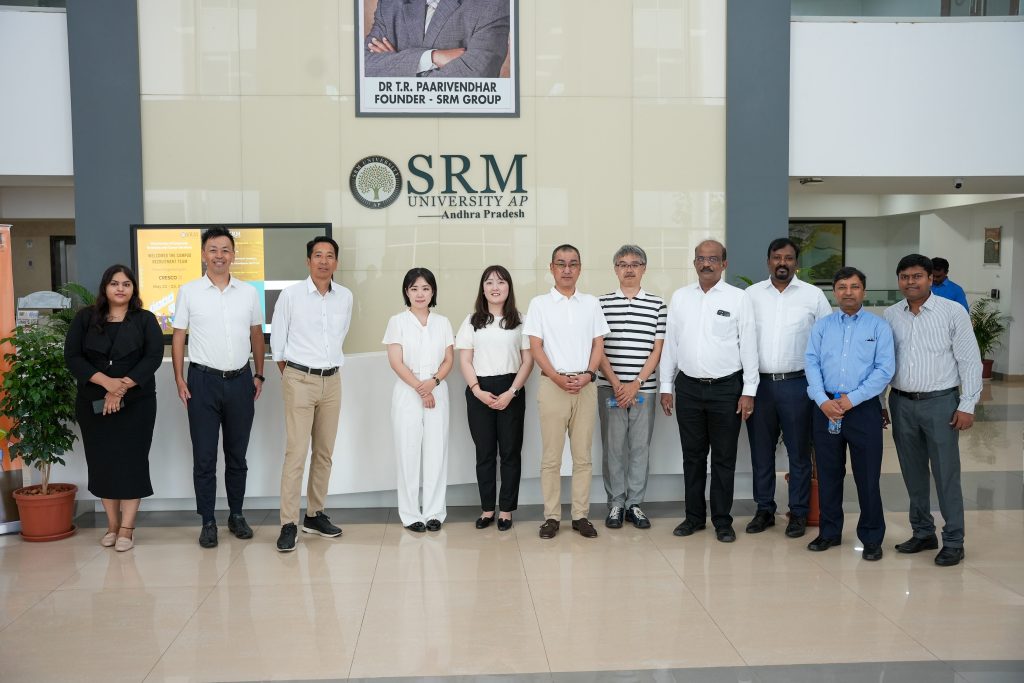
SRM University-AP, with its uniquely curated “Destination Japan” program for its highly skilled Engineering & Non-engineering Students, is an initiative by the university to address the growing demand for human resources in Japan. The ‘Destination Japan’ program provides well-equipped engineers with valuable industry skills and well acquainted with Japanese culture. Under the programme, students are trained in the Japanese language, Japanese traditions, and work culture from the first year onwards, which helps them easily assimilate into the country’s workforce. The initiative also welcomes reputed companies from Japan to directly hire skilled engineering graduates from core engineering fields to enhance their manpower.
SRM University–AP has also signed MOUs with multiple universities in Japan for faculty & student exchange programs, collaborative R&D projects, Hi-tech & innovative labs and other academic initiatives complementing the “ Destination Japan “ program.
To further enhance this mutual alliance, the Director of Corporate Relations & Career Services of SRM AP, Dr Vivekanandan M S, has visited prospective companies and industries in Hamamatsu, Japan, during which he presented the stellar record of engineering graduates being nurtured at the varsity and the possible partnership for recruitment and employment.
SRM University-AP has also signed an agreement with the Shizuoka Government to foster Indo-Japanese academic and recruitment partnerships. These partnerships enable internships in Japanese organisations, admissions to universities for higher studies, and good career placement opportunities for their students in Japan.
Under the “Destination Japan” program, direct campus recruitment has begun with the visit of recruitment teams from two reputed Japanese companies, Forum Engineering Inc. and CRESCO Ltd., to hire proficient engineering graduates. This is a remarkable accomplishment for the university to ensure international placements for its students.
A recruitment team of four from CRESCO Ltd, including the Managing Director, and a team of two from Forum Engineering Inc. visited the university campus. The team included engineers, HR Executives and other professionals.
Many more Japanese companies are lined up for campus visits & recruitment in the coming months.
In an interaction with the recruitment teams from Japan, Mr Satoshi Iwami, MD of CRESCO, remarked, “As we are facing a shortage of IT engineers not only in our company but all over Japan, and with the SRM AP harbouring excellent IT engineers, we decided that an alliance would greatly benefit both parties.”
Ms Saho Funahashi, UI/UX Designer at CRESCO, said, “The students’ Japanese skills have impressed me. SRM University-AP has helped students understand the practical way of studying engineering through its impressive resources. This would greatly benefit them in a techno-driven country like Japan.”
Mr Mitsutaka Sekino, Operating Officer at Forum Engineering and Director of Cognavi India stated, “Due to the population crisis, the Japanese economy is getting weaker, but we believe hiring an able workforce from SRM AP to Japan will help improve the economy. We have come to hire excellent students from the university, and I’m greatly impressed by their proficiency in Japanese and their work attitude.”
Mr Masahiro Koizumi, Senior Executive Officer at Forum Engineering and Managing Director of Cognavi India, opined, “We, from Forum Engineering, have come here with the intention of recruiting high-skilled engineers. Furthermore, the clients of Forum Engineering, the manufacturers of electrical and mechanical equipment in Japan, have been facing a shortage of engineers. They desire Indian students to come to Japan and help resolve the problem.”
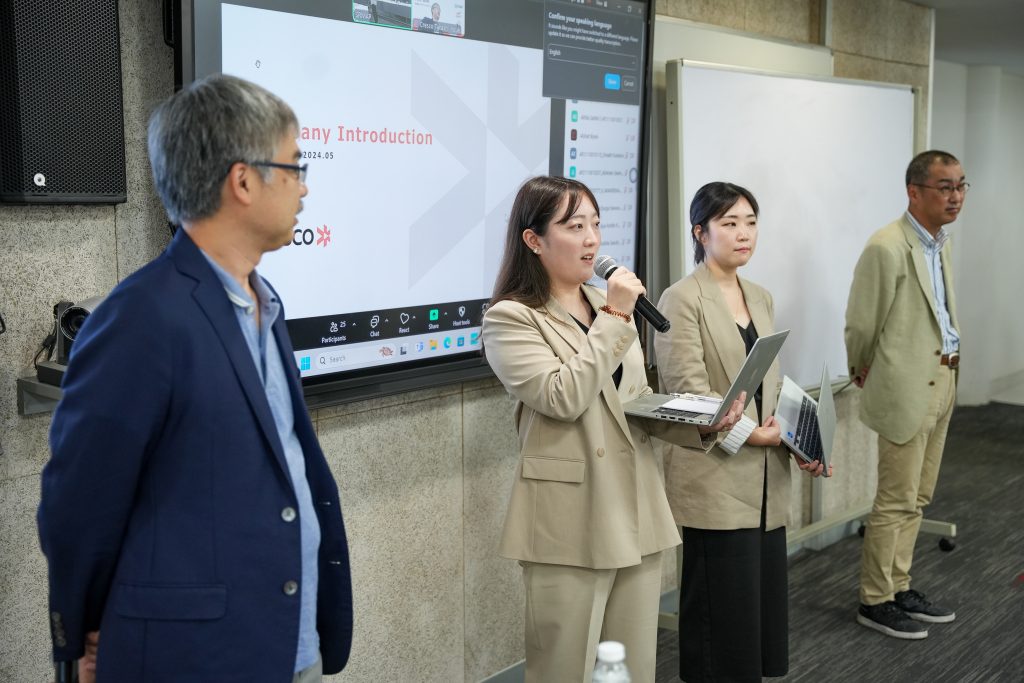
This program is guided and driven by SRM Global Consulting Private Limited, a consulting company of SRM Group established in Japan. Speaking on this, Mr Sankar Karunanidhi, Country Manager, SRM Global Consulting, mentioned, “SRM Group has had a long-standing relationship with Japan for over 25 years. This association has helped us design this unique program and training for our university students”.
This flagship initiative by SRM University-AP is helping Japan alleviate its labour shortage in various industries. Highly skilled graduates from India can get lucrative placements in Japan, ensuring a good work-life balance and career growth opportunities. SRM University–AP, continuing its success of placing students in Japan with the dedicated program and the team behind Destination Japan, envisions placing a minimum of 120 Highly Skilled students in Japan year-on-year.
Vice Chancellor of SRM University-AP, Prof. Manoj K Arora, said this remarkable venture by the two parties would enrich the student’s academic experience, moulding them into global citizens with exceptional industry acumen. “We have established a prolific alliance with Japan. We plan to extend our collaborations to place our students in Taiwan, Canada, Germany and other European countries,” stated the head of the institution.
The continuous dedication and support from the team’s leading both nations guarantee prospective Indian graduates a once-in-a-lifetime opportunity to secure their dream careers in Japan.
- Published in CR&CS, CR&CS NEWS, Departmental News, News


